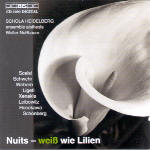As is often the case with recordings of avant-garde music it is probably best to skip the liner notes and go right to the music. The first four paragraphs of the notes accompanying this disc have nothing whatsoever to do with what you are about to hear; rather, they do more to obfuscate and confuse. They are a meditation (and a pretentious one) on the contrast of darkness and light, and their pomposity does a disservice to what is an otherwise provocative collection of music.
Some of these pieces work very well, some do not, but this is part of the tacit understanding we all carry when listening to “new” music. Surprisingly, the liveliest pieces are by Giacinto Scelsi, who was something of an outsider even to the outsiders of his time. His Tre canti sacri is given a powerful and profound reading by the Schola Heidelberg, which takes Scelsi’s wonderful screeches and makes good solid music out of them. The performance of the quirky, jaunty, and intense TKRGD (which is not a word, and consequently the six male singers intone syllables rather than a proper text) is this disc’s high point, both in terms of artistic quality and in terms of sheer volume! The Heidelberg chorus, joined by the Ensemble Aisthesis, attacks the Scelsi with the same power it does Webern’s Zwei Lieder, using the proper combination of ferocity and restraint needed to carry off this taut music.
Most of the pieces on this release are slow, like the Ave Maria of Toshio Hosokawa, René Leibowitz’s Blake settings, or Ligeti’s Lux aeterna, and the chorus manages to sustain the intenstity and stay well in tune (no easy trick in unaccompanied atonal music). The ensemble’s rendering of Xenakis’ Nuits is (undoubtedly unintentionally) hilarious: the singers navigate the composer’s screams and belches–and his use of the so-called “nasal pizzicato”–with interest and accuracy. Anyone laughing is laughing at the piece itself, not the performance.
There also are less-good moments, such as Cornelius Schwehr’s deutsche tänze, but these usually don’t result from any shortcomings on the part of the performers: Schwehr’s technique is not terribly effective, using whispers and vocal clicks in lieu of music, and ignoring Brecht’s fascinating text. With the exception of Scelsi’s Tre Canti, which obviously was recorded in a different hall from the rest of the pieces, the sound is consistent and intimate enough to capture all the choral nuances, and to effectively overwhelm when needed.
































